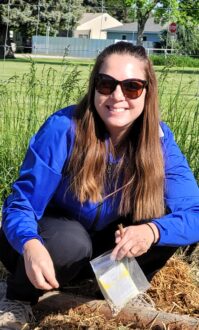After a two-year hiatus due to the COVID-19 pandemic, SARE Fellows recently reconvened to examine sustainable practices used in five crop and livestock production systems in Wyoming’s Bighorn Mountains. Guided by Caitlin Youngquist and Jenna Meeks of the Western SARE Professional Development Program (WSARE PDP) team at the University of Wyoming, SARE Fellows examined how Wyoming ranchers use innovative approaches to produce beef, small grains, corn, vegetables and more on Wyoming’s arid landscape.
The first stop located in the red soria hills outside of Buffalo, WY on the eastern side of the Bighorn range, was Merlin Ranch, owned by Mark and Jennie Gordon. There, ranch manager Kevin Rodriguez shared a variety of strategies Merlin Ranch uses to produce high-quality cattle in an environmentally sound manner, including carefully planned rotations and monitoring of range and water resources to help maintain the long-term productivity of the ranch’s range and forage systems. Merlin’s Black Angus/Hereford cattle herd is continually improved by focusing on a breeding program that selects for beef production as well as disposition. They also use a short-season sandhills calving strategy to ensure that new calves are born on clean ground to suppress disease and improve health.
After a brisk picnic lunch, Fellows visited Brewster Ranch to conduct the daylong “Reading the Farm” activity where they examined, in depth, the challenges of managing cattle on widely dispersed rangelands on the western slopes of the Bighorn Mountains. Brewster Ranch’s herd of 265 Black Baldy cattle is bred to thrive in rangeland conditions with minimal input. However, low rainfall and poor soil conditions still present the ranchers with challenges. In the fall and winter, the herd is kept on the ranch on the bottomlands of the Nowood River. When spring arrives, the herd is turned out to higher elevations onto a nearby lease of public range before being trucked 50 miles to spend the summer on privately leased mountain pastures. When snow comes and prevents grazing at higher altitudes, the entire herd is trailed back home to the Nowood River. Following the tour, along with the ranchers, Fellows discussed strategies for managing integrated crop and grazing lands, including the use of goats to reclaim range and using various marketing strategies to diversify income streams.
The next day, Fellows lent a hand weeding and planting at the Worland Community Gardens before heading to Ondo Farms to discuss the challenges those farmers face as they transition to no-till production in sugar beet and corn fields. A short stop at Baker Farms in Thermopolis, Wyoming, illustrated a successful transition to no-till grain production systems despite ongoing pressures from weeds brought onto the farm via irrigation waters.
The last day of the tour featured a stop at Legend Rocks Petroglyphs Site followed by a visit to the Arapaho Ranch, a 300,000-acre grassfed beef operation on the Wind River Reservation. There, Fellows learned about the tribe’s efforts to establish a high-quality, sustainable ranch management program within the context of Native American values and experiences. During a reflection period at the conclusion of the tour, one Fellow remarked: “I really appreciated the opportunity to visit and then break bread with our hosts. It really provided an opportunity to ask questions and learn in a more comfortable setting.”
The SARE Fellows program enhances understanding of sustainable agriculture through broad-based training and immersive educational experience to successful and unique sustainable agriculture operations. SARE Fellows receive support to participate in a two-year experiential training program that highlights innovative production systems nationwide. Interested in becoming a SARE Fellow? Visit https://www.sare.org/fellows for more information.
